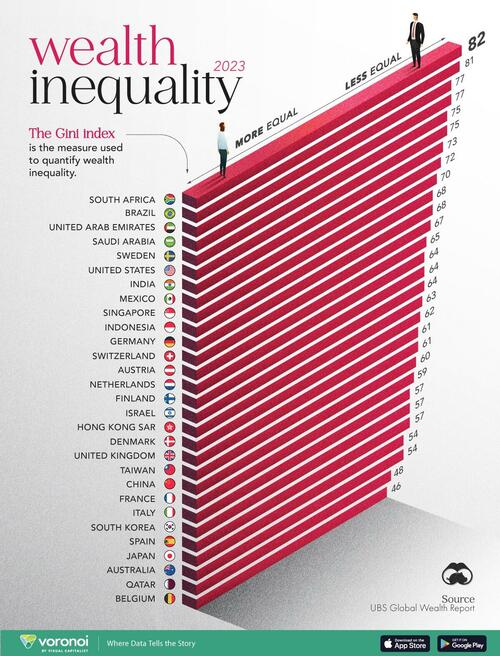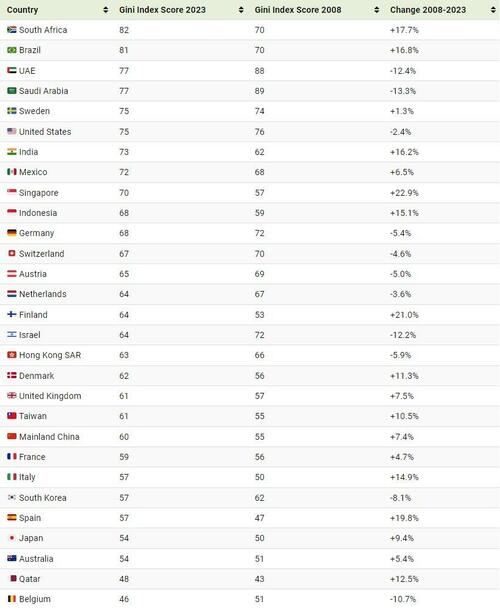
How is wealth distributed across countries, and what is the scale of these disparities?
This graphic, via Visual Capitalist's Kayla Zhu, shows wealth inequality by country in 2023, based on data from UBS.
How Wealth Inequality Compares Globally
One common way of measuring wealth distribution in a country is the Gini coefficient. In this index, scores closer to zero indicate more equal wealth distribution, while a score of 100 indicates that one individual holds all the wealth.
Here are Gini index scores across select countries, highlighting how they have changed over time:
South Africa ranks highest overall, with 10% of the population controlling approximately 80% of the country’s wealth.
Over the last 15 years, wealth inequality has increased. Unemployment has surged to 32%, up from 20% in 2008, while inflation-adjusted GDP per capita has declined. Even though apartheid took place three decades ago, race remains a key factor in income disparities.
Ranking in second is Brazil, a country where the richest 10% control half of the nation’s wealth. Between 2023 and 2024, the number of billionaires in the country jumped from 51 to 64, making Brazil home to the tenth-highest number of billionaires in the world.
Despite being a socially democratic country, Sweden ranks fifth overall. The country has one of the highest billionaires per capita, at one per 250,000 people. By comparison, the U.S. has roughly one per 500,000 people. Driving this concentration of wealth is the country’s thriving tech sector, which has produced over 40 unicorn companies, such as Spotify and Skype, over the last two decades.
We can see that the U.S. follows next, a country whose wealth inequality has fallen marginally since 2008. A similar trend of declining wealth inequality can be seen across other European nations including Germany, Switzerland, and Austria in addition to South Korea and Hong Kong.
Particularly in developed countries, the wealth gap has narrowed since 2008 as the middle segment experienced faster wealth gains than those in higher wealth brackets.
To learn more about this topic from a U.S.-based perspective, check out this graphic on wealth distribution by income group in America.
How is wealth distributed across countries, and what is the scale of these disparities?
This graphic, via Visual Capitalist’s Kayla Zhu, shows wealth inequality by country in 2023, based on data from UBS.
How Wealth Inequality Compares Globally
One common way of measuring wealth distribution in a country is the Gini coefficient. In this index, scores closer to zero indicate more equal wealth distribution, while a score of 100 indicates that one individual holds all the wealth.
Here are Gini index scores across select countries, highlighting how they have changed over time:
South Africa ranks highest overall, with 10% of the population controlling approximately 80% of the country’s wealth.
Over the last 15 years, wealth inequality has increased. Unemployment has surged to 32%, up from 20% in 2008, while inflation-adjusted GDP per capita has declined. Even though apartheid took place three decades ago, race remains a key factor in income disparities.
Ranking in second is Brazil, a country where the richest 10% control half of the nation’s wealth. Between 2023 and 2024, the number of billionaires in the country jumped from 51 to 64, making Brazil home to the tenth-highest number of billionaires in the world.
Despite being a socially democratic country, Sweden ranks fifth overall. The country has one of the highest billionaires per capita, at one per 250,000 people. By comparison, the U.S. has roughly one per 500,000 people. Driving this concentration of wealth is the country’s thriving tech sector, which has produced over 40 unicorn companies, such as Spotify and Skype, over the last two decades.
We can see that the U.S. follows next, a country whose wealth inequality has fallen marginally since 2008. A similar trend of declining wealth inequality can be seen across other European nations including Germany, Switzerland, and Austria in addition to South Korea and Hong Kong.
Particularly in developed countries, the wealth gap has narrowed since 2008 as the middle segment experienced faster wealth gains than those in higher wealth brackets.
To learn more about this topic from a U.S.-based perspective, check out this graphic on wealth distribution by income group in America.
Loading…






